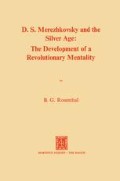Abstract
Through a salon, a discussion group, and a revue, the ideas Merezhkovsky expressed in his writings achieved even greater circulation and markedly affected the cultural climate of the time.
Access this chapter
Tax calculation will be finalised at checkout
Purchases are for personal use only
Preview
Unable to display preview. Download preview PDF.
References
For a more detailed description of the aura of the salon see Berdyaev, Dream and Reality, pp. 145-47; Bely, Nachalo veka, p. 190 and Epopeia, pp. 181-89; G. Chulkov, Gody stranstvii (Moscow, 1930), pp. 129-39.
Bely, Epopeia, pp. 211-12. See also pp. 193, 279.
Berdyaev, Dream and Reality, pp. 144-45.
Zernov, p. 91.
Zapiski (op. cit.), and Peter Scheibert, “Die Petersburger religiös-philosophischen Zusammenkiinfte von 1902-1903” in Jahrbücher für Geschichte Osteuropas, 1964 XII, no. 4 (Apr.), pp. 513-60.
Rozanov was legally married to Apollonaria Suslova, a former mistress of Dostoevsky. A shrewish woman, she refused to grant Rozanov a divorce. As a result he was living with another woman who bore him children, but he could not marry her until his legal wife died which was not until 1918, one year before his own death.
Zapiski, p. 520.
Zapiski, pp. 384-86. The theme of the session was Rozanov’s report on the “two paths” of Minsky. In the course of discussion, the question of the apocalypse was also brought in.
Ne mir, p. 93.
Zapiski, p. 91. This was the fourth session; irreconcilable differences were already obvious.
Ibid., pp. 92-93.
See Zernov, pp. 96-99.
Oleg Maslenikov, The Frenzied Poets (Berkeley, 1952), p. 131.
To the best of my knowledge, there is no up-to-date study of the movement for religious reform.
Berdiaev, Sub Specie Aeternitatis, pp. 138-39.
This was in July 1905.
The Maksimovs (op. cit.) attribute the decline of the “thick journal” to capitalism. According to them, capitalism caused the intelligentsia to disintegrate into groups of specialists and professionals, thus depriving the “thick journals” of their previous audience of dilettantes. A host of journals, catering to specialized tastes sprung up; among them, the symbolist revues. To the Maksimovs symbolism was the philosophy of bourgeois individualism; its mysticism was the antithesis of its materialistic practice. Hatred of the mob and mass culture comprise its chief traits. Written at the beginning of Stalin’s campaign to control literature, the Maksimovs’ charge that symbolism was the tool of the bourgeoisie became a cliche during the Stalin era. See especially pp. 83-128 (“Journals of Early Symbolism”) and pp. 131-54 (“Novyi Put’”).
Novoe Vremia, January 27, 1914, p. 4; January 29, p. 4; January 30, p. 5. See also Russkoe Bogatstvo 1914, no. 3 (Mar.) pp. 387-88.
Missionerskoe Obozrenie June 1903 p. 1382. There seems to have been a conflict on the journal staff. When the Religious Philosophic Society first began, its activities were reported in a regular feature called “From the Halls of the Religious Philosophic Society”. Disillusioned by their failure to convert the intelligentsia, however, the greater circulation afforded heresy by the printing of the minutes, appeared to have frightened the editors and enabled the conservatives to win.
N. Minsky, “Novyi Put’ i put’ sataninskii”. Novyi Put’, 1903, no. 4 (Apr.) p. 198. See also B. Bartenev, “Neudachnyia ob’iasneniia”, Novyi Put’ 1904, no. 7 (July), pp. 267-72.
Chulkov, pp. 63-64. This is a quote from Pushkin’s Poltava about an ill-matched mariage.
Perusing Novyi Put’ indicates the tremendous impact on the Russians of Russia’s defeat by Japan. The February 1904 issue contained several articles on the materialistic nature of Japanese culture and society (due to the Shinto religion) and the similarity of Japan to the “shallow” United States. Solov’ëv’s warning of a “yellow peril” was also recalled. The Merezhkovsky-Hippius-Filosofov drama Makov tsvet’ (1906) portrayed the war as a burning issue which divided entire families. It was published in Russkaia Mysl’, 1907, no. 11 (Nov.) pp. 96-164 and was probably written by Hippius alone.
Zapiski, p. 243. The subject was Merezhkovsky’s report on Tolstoi and Dos-toevsky. Heated discussion ensued on Dostoevsky’s view that man cannot be good without God.
For Berdiaev’s apocalyptism see Florovsky, p. 490. For Bulgakov’s see Tread-gold, The West in Russia, who quotes Bulgakov as follows: “I said to myself, men will be Gods, and so, it seems, did others”, (p. 221). See also Zernov, pp. 97-98. For the post-1905 philosophy of Berdiaev and Bulgakov, see Zenkovsky, 760-80 and 873-916 and Zernov, 137-59 and 283-308.
Maksimov, p. 166.
Makovsky, p. 32. For a more positive view, however, see Treadgold, The West in Russia, pp. 231, 241, 253.
Rights and permissions
Copyright information
© 1975 Martinus Nijhoff, The Hague, Netherlands
About this chapter
Cite this chapter
Rosenthal, B.G. (1975). Proselytizing the “Third Revelation”. In: Dmitri Sergeevich Merezhkovsky and the Silver Age. Springer, Dordrecht. https://doi.org/10.1007/978-94-011-9036-7_7
Download citation
DOI: https://doi.org/10.1007/978-94-011-9036-7_7
Publisher Name: Springer, Dordrecht
Print ISBN: 978-94-011-8353-6
Online ISBN: 978-94-011-9036-7
eBook Packages: Springer Book Archive

